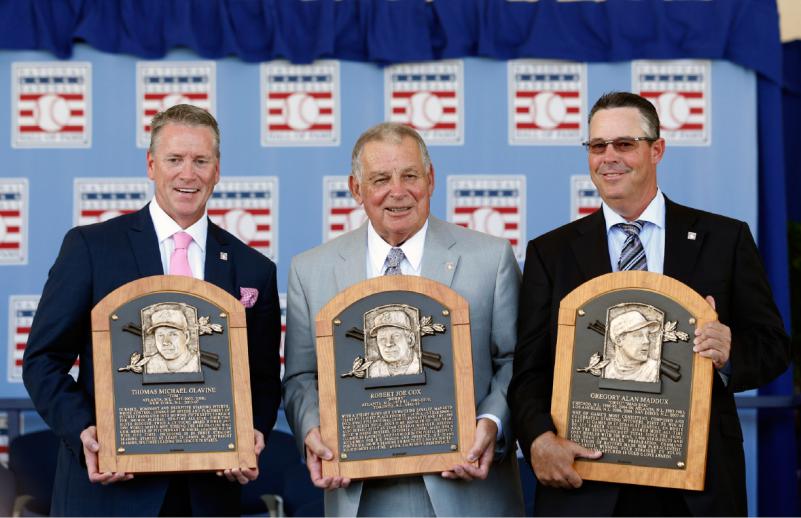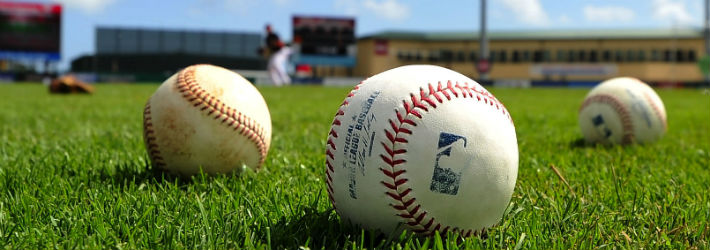Major League Baseball is continuing its quest to find the right formula to make more baseball fans as interest in the game seems to be waning.

MLB’s Formulaic Strategy
MLB has several initiatives designed, at least in part, to bring fans to baseball, especially younger fans as MLB has the oldest fans of the major sports. One of the initiatives is attempting to shorten games to better suit our culture’s short attention span. Pace of game changes made by MLB in 2015 allowed the league to pat itself on the back for shortening a roughly 3-hour game by 6 minutes and seven seconds. In 2016, MLB implemented an official time of 30 seconds for mound visits. It appears limiting time between pitches might be coming soon; AA and AAA leagues already enforce it.
My friend Philip Tapley of modernpastime.com published an article considering the effectiveness of other initiatives MLB is mulling in an effort to drive fans back to baseball, such as ways to increase home runs and reduce strikeouts. He didn’t seem overly optimistic these “minor tweaks” would have much impact in attracting fans even if they led to more scoring across the board. His conclusion is that baseball is exciting enough, but more could be done to attract a wider audience, specifically pointing to exclusionary cost of participating in youth baseball.
As much as chicks dig the long ball, I agree that these initiatives won’t work, and I agree that one of the main issues is youth engagement, but I’m going to expand the problem beyond the exclusionary cost of participating in youth baseball to an area I am passionate about, and it’s not analytics.
Creating Fans is About Connections, not Formulas
Creating a baseball fan isn’t about finding the right formula; it’s about connecting through emotional experience. There’s two general paths to fandom, and they can overlap.
For some, fandom might slowly develop through repeated exposure into a deeply rooted love for the game. For me, my fandom began while watching minor league games in Jackson, Mississippi as a kid back in the early ’80’s. We lived near the stadium and would go regularly. When I moved to Rome, Georgia in the mid ’80’s, we’d regularly go to Atlanta-Fulton County Stadium, which at the time was basically a really big minor league experience. I loved it! I remember going to games with my dad. Baseball with dad is a classic emotional connection to the game. It primarily builds a bond with dad, but it also builds a bond with the game. Loving Dad, loving Baseball, Loving Apple Pie, Loving America – it all becomes the same thing after a few years of being mixed together.
For others, there is “The Moment” when the game connects. I remember watching my son fall in love with one swing of the bat. It was the ALCS in 2013. David Ortiz hit an 8th inning game-tying grand slam for the Red Sox. My son – almost six years old – watched a packed Fenway’s rising energy explode as the ball barely cleared Torii Hunter‘s heroically unsuccessful dive into the right-center field bullpen. If asked, I don’t think he could describe why he started loving baseball, and he might point to all of the baseball activities we’ve done since that moment as his connection to the game, but I know when “The Moment” happened for him. I saw baseball come to life in a little boy, and it was awesome:
What drives interests in the game? Experiencing an event that connects to a player that connects to a team that grows into an emotional connection to the game. My son’s favorite team is the Braves because my favorite team is the Braves, but don’t think he doesn’t have a soft spot for David Ortiz and the Red Sox. Ortiz’s clutch grand slam brought my son into the fold. It is the origin story for his love of the game.
A formulaic approach can create a slightly shorter average game length and increase home runs a tick, but it isn’t going to bring people into the fold. Creating a fan isn’t just about length of game; it’s about connection to the game. People are taught baseball is boring, and they never get a real chance to discover why it is not until the “baseball is boring” mantra is framing their exposures to it. Emotional connection drives interests in all things baseball (and most things in general). It is what is needed, not shorter games or new rules or fewer strikeouts or even more home runs.
How can baseball increase its fan base? Here’s two suggestions:
1. Baseball needs to increase exposure to the game, especially for children.
Major League baseball increased its revenue to all time highs in large part through exclusive cable deals and regional blackout restrictions and start times geared toward key demographics, but I think they are being short-sighted with this money-first approach. It is stealing from the game’s future. Blackouts, exclusive rights, late start times, these hurt the creation of new fans because they limit opportunities for sports-uncommitted youngsters to witness a fan-creating moment. If baseball wants more fans, it needs to create more opportunities to expose people to baseball so more potential fans have more potential opportunities to have “the moment” that sparks a lasting connection to the game. Sure, there is room for the business side of baseball, but the scale is tipped too far toward concerns of generating revenue at the expense of generating the next generation of fan.
One way MLB executives can improve access to “the moment” is to end the ridiculous, and possibly illegal, blackout restrictions by regional market. I’d consider purchasing MLB-TV if the Braves weren’t blacked out. It’s especially frustrating since I live exactly 351 miles from Turner Field. We also do not have cable, as is a growing trend, so I have no way to watch Braves games. Good thing the radio package is cheap, but how many millennials and Gen-Zers (or whatever my son’s generation will be called) enjoy listening to baseball on the radio? It’s hard enough getting them to stop and watch a game on TV! At best, we watch game highlights.

MLB should consider the long-term impact of the huge, exclusive cable contracts. There used to be more of a national market for baseball. In this broader market, it was easier for larger than life players to emerge and draw a national following because people all watched larger than life moments together – not clips the next morning on individual devices. Maybe it’s just me, but it means more when you’re invested in the building emotion of the game and share the joy/sorrow of outcome in community. But the market has become so chopped up that it limits exposure to great players and shared moments and building energy. I’m not a fan of the regional markets and blackouts. I don’t know who is other than the businesses that profit from them, but businesses aren’t people who become fans.
Some might say the problem is baseball just doesn’t have great players like it used to. I say the problem is the market no longer allows players to be marketed like they used to. Sure, there is more competition for attention in the technology age, but baseball is taking a problem and finding ways to make it worse, not better. There are players who could be building the game nationally if they could break out of a fragmented and exclusionary market created largely by MLB itself. Bryce Harper is a perfect example. He had a undeniably great year at the plate last year in terms of traditional and advanced stats. At 23, he’s breaking out and he’s already built a foundation to make a run at some all-time records. People love him and love to hate him. The problem is that baseball struggles to expose him to enough people – especially young people who have easy access to most everything else – to tip interests in Harper from regional to national, at least on a sustained basis.
A final point here, and perhaps the one I am most passionate about as a father to four young children, is that baseball needs to move the start time up for evening games. That ALCS Game where I had the joy of watching the baseball flame ignite in my son? It started at 8:16 p.m. Eastern Standard Time. The game-tying Ortiz grand slam happened in the bottom of the 8th inning. The game lasted 3 hours and 28 minutes. That means on the east coast, it was after 11 p.m. when the building excitement exploded. It was close to midnight when the Red Sox scored the winning run in the bottom of the 9th. I live an hour earlier in the Central Time Zone, and all this was still happening well after my son’s bedtime. I remember letting him get out of bed to watch some of the game, and that’s the only reason he was exposed to an important moment for him and for a sport that desperately needs lots of hims.
A magical moment in baseball was missed by tens of thousands of young potential fans because baseball is blinded by the present money and can’t see the cost the current decisions are having to the future fan base.
Unless a game is on the West Coast, it shouldn’t start after 7 p.m. EST at the latest, and more games need to be played in afternoons, not to chase the primetime, key demographic audience, but to be available nationally with easy access through multiple media options when children are most likely to be on them. Nine inning games shouldn’t end close to midnight, especially when the circumstances are primed for magical, fan-creating moments like the baseball playoffs. This is not as much an issue of shaving 10 minutes off a game as it is playing the game past the time the next generation can watch it to the end, or in ways where the next generation can’t watch it at all. In my opinion this is baseball robbing children of baseball, which robs baseball of future fans. It’s a lose-lose.”
2. Baseball Needs to feature compelling story lines to draw national interest

Admittedly, this is not completely under the control of MLB, and they do feature story lines. To an extent, story lines emerge because the game is built for story lines to emerge. We don’t have a nationally compelling story right now akin to Roger Maris chasing Babe Ruth‘s single season home run record, or Hank Aaron chasing the all-time home run record. These players’ records have since fallen, but the impact of the fall was muffled historically by performance enhancing drugs and unlikable stars with whom fans struggle to relate (hello Alex Rodriguez and Barry Bonds). The down-to-earth Maris and Aaron were people’s people who became larger than life. They were regular people living the dream of every boy and girl who picked up a bat and imagined hitting a game-winning home run one day. Eventually, most of us have to admit it wouldn’t happen for us, but a down-to-earth superstar proved that some kids like us could grow up to live the dream of playing the game we all loved. They were the one of us who made it.
The last time we had a real experience of a nation following a specific story line (at least that I remember) was Mark McGwire and Sammy Sosa battling each other for the single season home run record in 1998. Magic was happening, and the nation noticed. I drove with a friend from Virginia to St. Louis in an attempt to catch the game in which McGwire might break Maris’s record; we wanted to be a part of something special. (Alas, we were one game early.) There was a buzz around baseball – and more importantly outside of baseball – because two lovable people from rival teams and vastly different backgrounds were pushing each other to accomplish a feat that made them larger than life. (Then the story became compelling for the wrong reason, and the game suffered for it.)

So what can baseball do here? I would suggest raising the average number of home runs a smidgen doesn’t matter much in terms of creating fans. It’s not the home runs themselves that draw fans, its the story lines of the people behind the home runs.
Even if story lines must be on a smaller scale for now, MLB can work more purposefully to identify and to market these stories nationally. Don’t market players as a sales-pitch or a baseball gimmick, market them as humans with compelling stories that connect players as people to everyday people. These stories can create secondary links to the game that appeal to non-fans. People came to baseball for awhile in the Summer of 1998 because of Mark McGwire and Sammy Sosa, not because of 61. The people there for 61 were already baseball fans. The hope is that some people who tune in because of a connection to a story about a person who plays baseball will stay because the person gave them a connection to the game of baseball.
Eventually another nationally compelling story will emerge and drive people back to baseball for awhile, and then baseball will slow down a bit as it lulls, it’s what baseball does. But MLB could be doing more, in my opinion, to connect the stories of people who play baseball to the people of the nation (and other nations) because the stories of the players are more compelling than the game for people who aren’t already connected to the game. Jim Morris wasn’t that interesting of a player in context of the game, but in context of his personal story, well, millions connected to his story in The Rookie.
The Bottom Line
I have no doubt Rob Manfred’s job is even harder than I imagine, and I have no interest in actually taking it on, but if I were Baseball Commissioner for a day, my primary focus would be getting the game in front of the next generation as much as possible, even if it costs a little bit of revenue today. Fix the crazy regional lines, roll back the blackout restrictions, and move up the start times. Engage people with stories of the game, and purposefully identify and market players and their stories nationally and internationally.
My message to Major League Baseball: If you love the game, don’t make is so hard for my kids to fall in love with it. Expose people as much as possible to it so they can have a greater probability of having “the moment,” too. Trust me MLB, once you’ve connected emotionally with a young fan, you’ve created a fan for life.




Nice article. I agree with you that late start times are a detractor from baseball catching on with younger generations. In the past, “average Joe” supposedly would have been able to casually stroll over to the box office with a buddy to catch a 7pm game after work. Since ticket prices are so prohibitive now, that is no longer a common occurrence; going to a game in person now requires a significant financial investment and is practically a major life event. Therefore, I agree that starting all games no later than 7pm EST is reasonable, and some games should start even earlier. If people can afford to attend a game, they are most likely either taking the day off anyway, or else they probably have the type of job where they could get out of work an hour or two early to accommodate such a “special occasion”. Besides: what would make being stuck in rush hour traffic on the commute home more enjoyable than having a ball game on the radio?
Likewise, the obscene MLB.TV blackout restrictions have got to go, if they want to move forward with the current generation as a fan base. The exclusive contracts with cable and dish providers are tantamount to MLB cutting off its nose to spite its foot. Young people stream everything, and they will not watch if they can’t stream it without tithing to an expensive TV provider. Count me among the frustrated cord-cutters in this camp.
On a side note: I don’t believe that game length has anything to do with the future success or failure of baseball. Even with all the ridiculous measures they’re putting in place to try to move the games along more quickly, they’re only going to be able to shave off ~15 minutes by the most optimistic projections. Trust me; the people who consider a 3 hour baseball game to be boring will still consider it boring at 2h 45m. Shaving off a few minutes does not solve the problem they’re trying to solve.
You’re right on in that what causes most kids to become fans is either a) family, or b) memorable drama.
Lastly, and I’m sorry to have to comment about this: mind your apostrophes. “…Baseball is continuing it’s quest…” *Cringe*. Enough said. Cheers.
Yes, all of that. Thanks even for the embarrassing apostrophe that I’m going to go fix now…
But my wife has actually tried to get me to get MLB.TV, but I can’t rationalize the expense because the Braves are blacked out most of the time (in Cards and Reds blackout market). Probably get it so can watch playoffs with my son. Otherwise, radio is fine. Like the announcers more anyway.